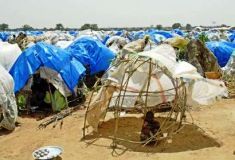Darfur peace talks back on track in Abuja
ABUJA, June 9, 2005 (IRIN) — Delegates representing Sudan’s government and rebels fighting in the country’s western Darfur region are set to resume talks in the Nigerian capital, Abuja, on Friday to seek an end to a conflict that has created Africa’s worst humanitarian disaster.

|
|
A displaced Sudanese girl sits inside a temporary shelter at Sreef camp near Nyala in south Darfur, October 8 , 2004. |
Previous talks collapsed six months ago after the government broke a ceasefire deal and mounted an offensive that seriously weakened rebel positions on the ground.
With the government now withdrawn from the positions it acquired in December, African Union (AU) mediators are hopeful of a solution to the two-year conflict that has claimed more than 180,000 lives and forced two million people from their homes.
“We expect to continue the negotiations from where we left off by going straight into the negotiation of the key political issues, having reached a humanitarian agreement last year,” said a senior AU official.
In December, all parties agreed to open up access for humanitarian assistance to the millions in the region urgently in need of food aid.
The AU will be mediating for a fourth time in Abuja between Khartoum and the two rebel groups: the Sudanese Liberation Army (SLA) and the Justice and Equality Movement (JEM).
Outstanding issues yet to be agreed by the Sudan government and the rebels – who took up arms in February 2003 alleging decades of neglect and oppression of Darfur’s African tribes by Khartoum – hinge on recognition of ethnic, cultural and religious rights and equitable distribution of power and national wealth.
Yet problems remain.
In the run up to the talks there has been fighting between the two rebel movements.
AU monitors on the ground in Darfur said at least 17 people were killed earlier this week when the larger rebel group, the SLA, launched attacks on positions held by the smaller JEM, an action likely to undermine the previous cohesion by the two groups noticed at earlier peace talks.
And the United States and the European Union have squabbled over whether NATO should become involved in the airlift of AU peacekeeping troops to Darfur, and over the formal launch of a probe on alleged war crimes in Darfur by the International Criminal Court (ICC).
To improve security in Darfur the AU plans to send in about 5,000 additional troops swelling the current force to over 7,000 troops. Both NATO and the EU have also been approached for logistical support.
But while the US wants NATO to coordinate the airlift, France wants the assistance to be provided outside the framework of NATO.
Despite opposition by Khartoum, the UN-backed ICC said on Monday it was beginning a formal investigation of allegations of atrocities against unarmed civilians in Darfur.
The two rebel movements blame the Sudan government and its reportedly close ally, the Janjawid Arab militia, of scorched earth attacks on unarmed Darfur villagers, slaughtering tens of thousands in the past two years.
To help those in dire need in Darfur, the International Committee of the Red Cross (ICRC) said it began airlift of food aid to the region on 4 June and expects the operation to last for two months, delivering some 4,000 tonnes of food to more than 220,000 people.
